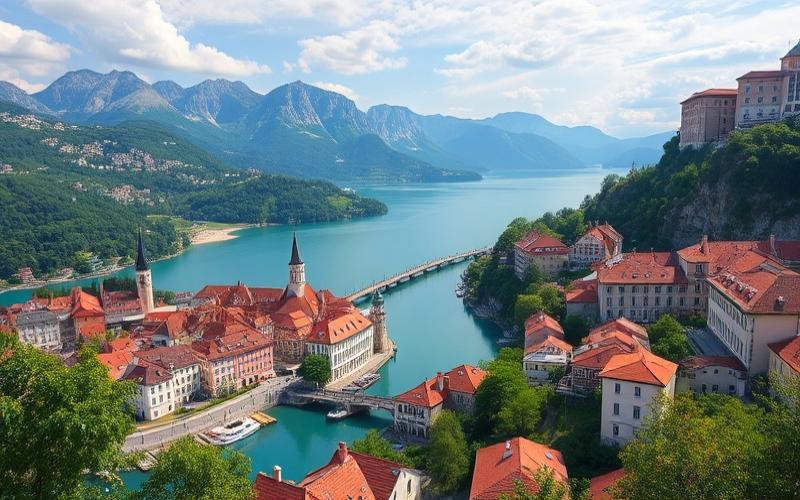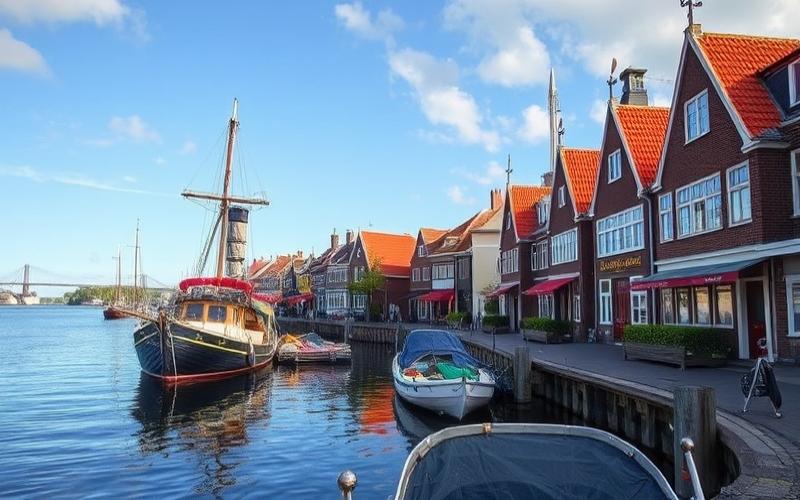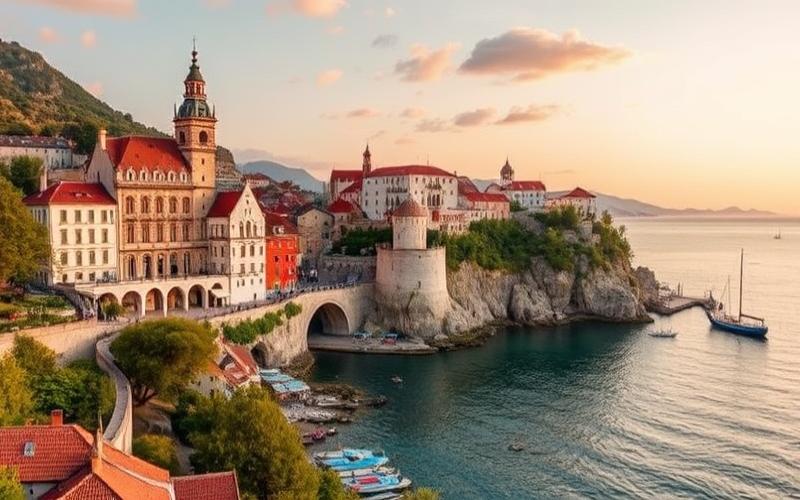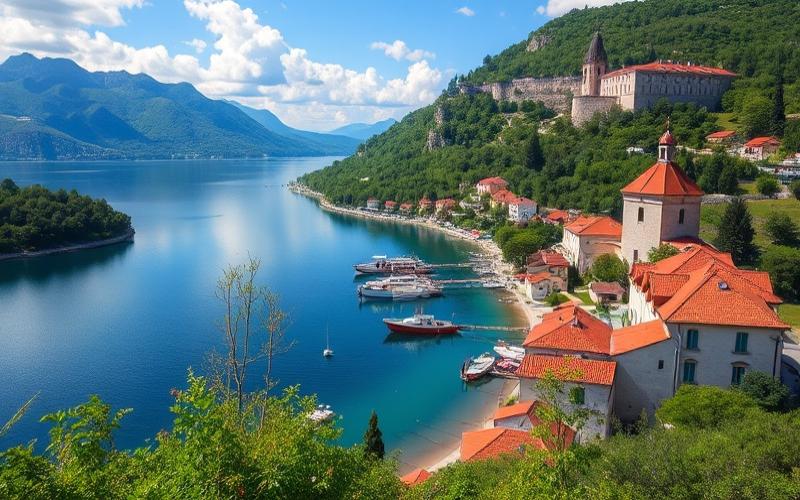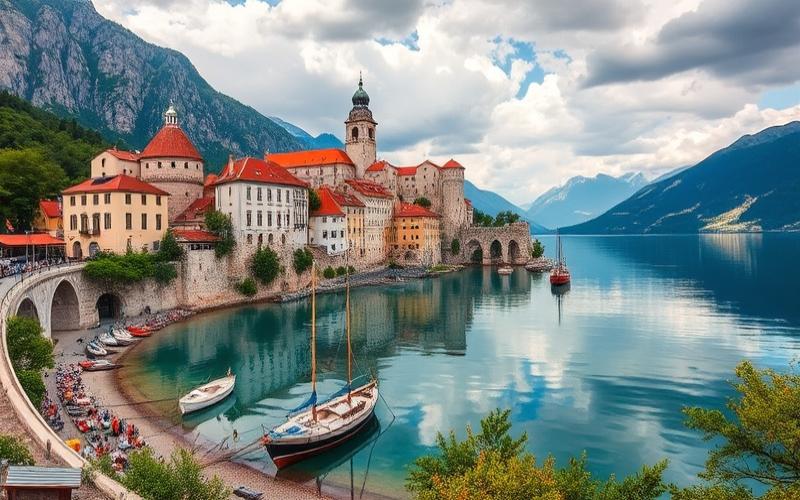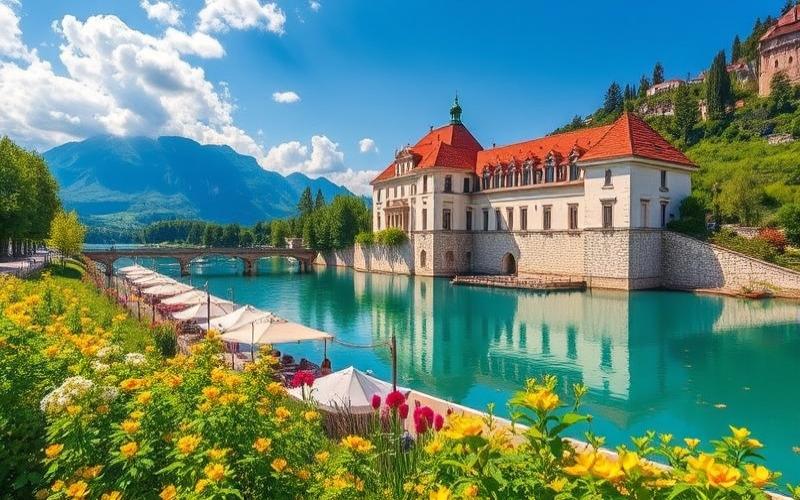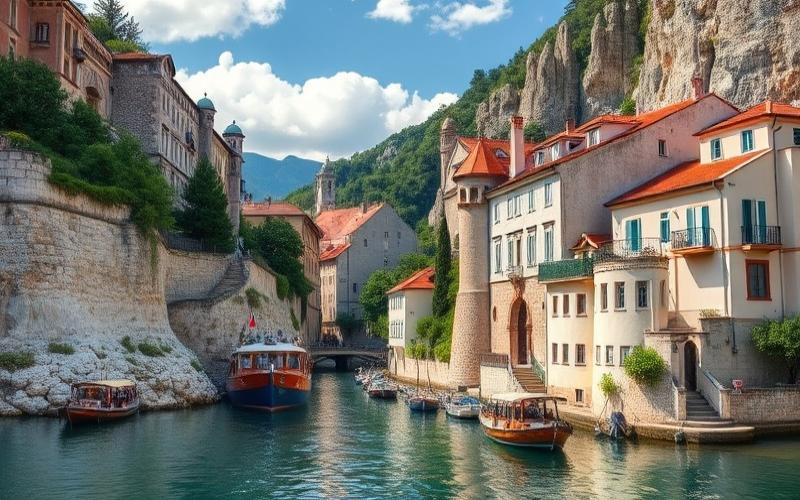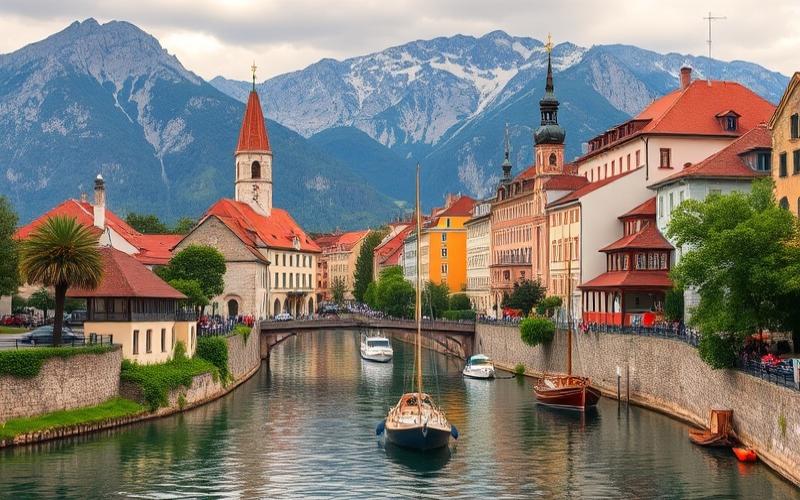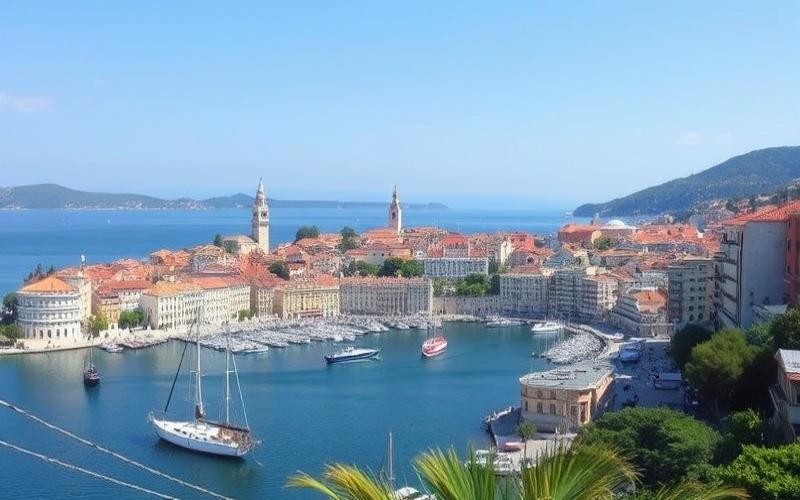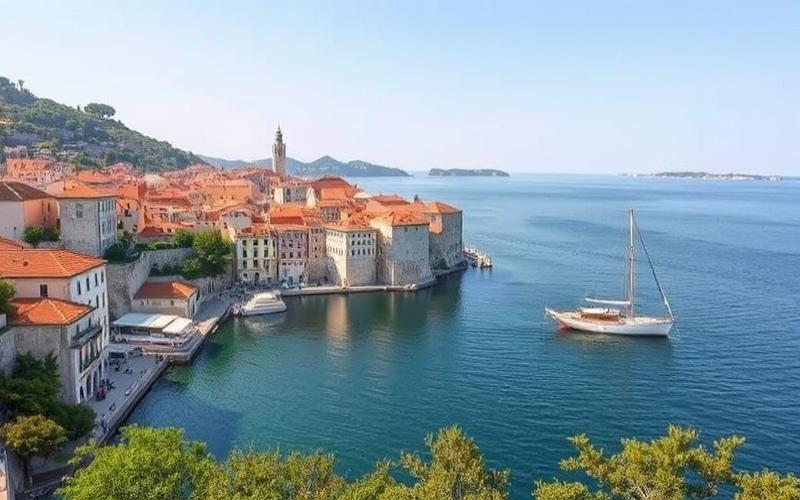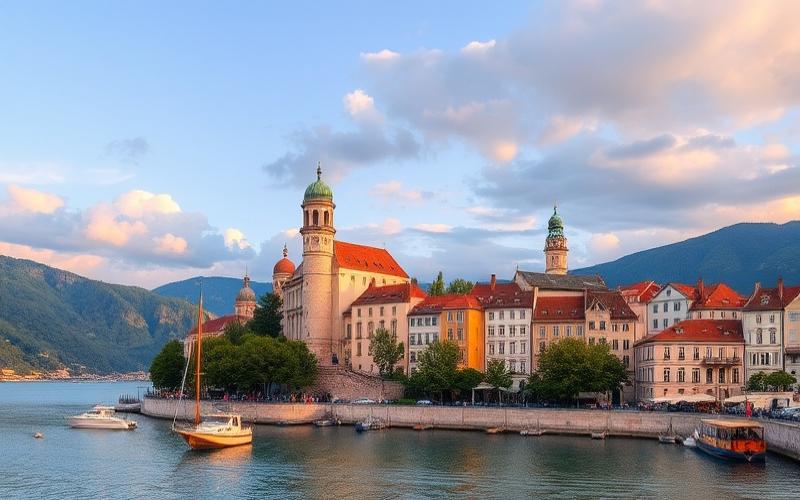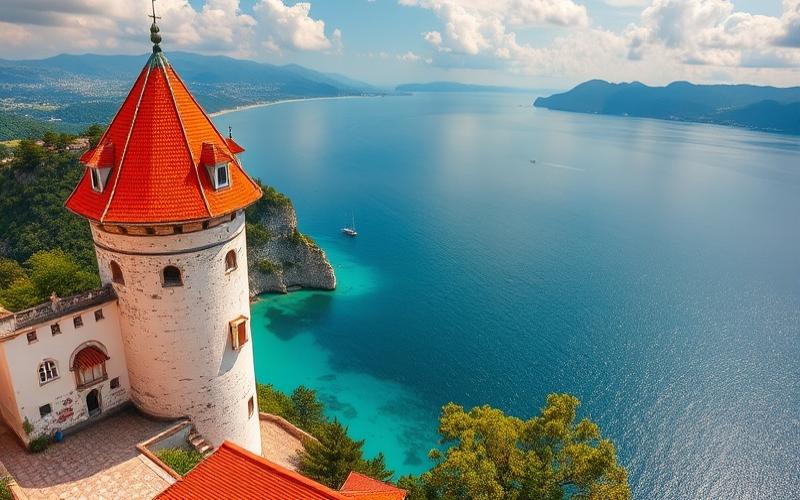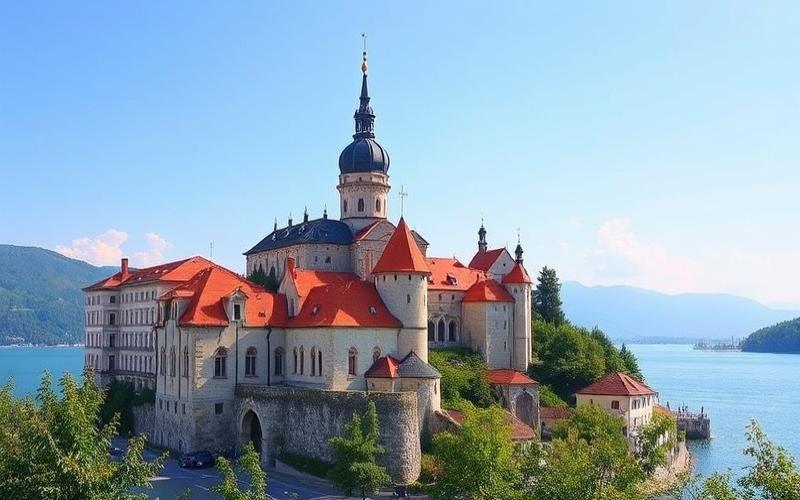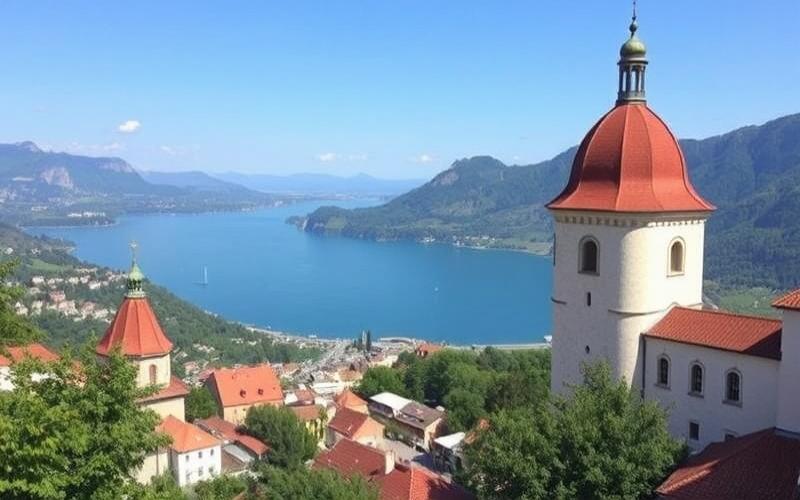
 Published on and written by Cyril Jarnias
Published on and written by Cyril Jarnias
Long-Term Property Rental in Croatia
Renting property long-term in Croatia might seem like a complex adventure, but by following a few essential steps, this process can become a rewarding experience. This fascinating country, known for its breathtaking landscapes and picturesque coastlines, offers numerous opportunities for those looking to settle there permanently.
In this article, we will explore the key steps to navigate the Croatian real estate market, from legal subtleties to selecting the right location. Whether you’re drawn to the historic charm of Dubrovnik or the lively atmosphere of Zagreb, our guide will provide you with the practical advice needed to successfully carry out your rental project with ease.
Good to Know:
Croatia offers an exceptional living environment with a relatively affordable cost of living compared to other European destinations.
Renting in Croatia: A Profitable Investment
Croatia offers attractive opportunities for real estate investors, particularly in long-term rentals, thanks to sustained demand and competitive rental profitability, especially along the Adriatic coast and in Zagreb.
Most Sought-After Regions for Long-Term Rentals:
- Zagreb: strong price growth (+2.8% in Q1 2025), urban dynamism, continuous demand due to urbanization and influx of workers.
- Adriatic Coast (Split, Dubrovnik, Zadar): tourist influx, interest from foreign investors, stable rental demand.
- Croatian Islands: notable increase in residential listings (+9% in 2024), 7% price rise over two years, international enthusiasm.
| Region | Price Increase (Annual) | Rental Demand | Investor Interest |
|---|---|---|---|
| Zagreb | +2.8% (Q1 2025) | High | Strong |
| Adriatic Coast | +10% (2024) | Very High (Tourism) | Very Strong |
| Croatian Islands | +7% (2023-2025) | Strong (Permanent + Seasonal) | Growing |
Rental Profitability and Market Trends:
- Property Prices: annual progression of 11 to 13.1% in early 2025, one of the highest growth rates in the EU.
- Market Dynamics: increase in transaction volume, demand exceeding supply in attractive areas, especially for new apartments.
- Rental Income: in the most competitive areas, gross profitability can reach 5 to 7% depending on the property type and rental duration.
Tax Benefits for Property Owners:
Favorable taxation for long-term rentals, with specific tax regimes for rental income, and possible deductions for expenses and renovations.
The status of tax resident or tax treaties with other EU countries can help optimize taxation on real estate income.
Economic Outlook and Market Stability:
- Stable growth in the real estate market supported by foreign demand, eurozone membership, and macroeconomic stability.
- Record high housing price index at 214.18 points in Q1 2025, indicating sector strength.
- High ownership rate (91%), limiting excessive speculation and promoting a structured rental market.
Potential Challenges for Investors:
- Continuous Price Increases: makes market entry more expensive.
- Supply Pressure: especially on the coast and islands, difficulty finding properties at attractive prices.
- Local Regulations: need to comply with rental rules, particularly for seasonal rentals.
- Increased Competition from foreign and local investors, especially in tourist areas.
Proven Strategies to Maximize Rental Income:
- Target major cities and tourist areas to benefit from dual seasonality (students in winter, tourists in summer).
- Invest in new or renovated properties to attract premium clients and reduce vacancy rates.
- Diversify between long-term and seasonal rentals based on region and demand.
- Optimize taxation through professional management (deductions, rental status optimization).
Croatia combines economic stability, competitive taxation, and strong rental demand, making rental investment a strategic choice for savvy investors.
Good to Know:
The Croatian real estate market offers great opportunities, particularly in coastal regions like Dalmatia and Istria, where demand for long-term rentals is growing rapidly. In 2023, rental profitability in these areas ranged between 5% and 7%, attracting many investors. Tax benefits, such as reduced taxation on rental income through regional incentives and capital gains exemption after three years of ownership, enhance the market’s appeal. However, challenges remain, such as the need to understand local legislation and manage tourist seasonality. To maximize income, it’s strategic to offer high-end furnished housing targeting expatriates and international professionals. The market is stabilizing with sustained economic growth, ensuring interesting return on investment potential, but guidance from a local advisor remains a valuable asset.
Keys to Confidently Establishing a Lease
Essential Steps to Establish a Rental Lease in Croatia:
- Search for suitable housing, either through a reliable real estate agent or directly from property owners.
- Check availability based on the type of lease (short-term or long-term).
- Prepare necessary documents:
- Valid identification for each party.
- Proof of income or rental guarantees (sometimes required).
- OIB number (Croatian tax identifier) for long-term residents.
- Draft and sign a written rental contract detailing all essential conditions: parties’ identities, property address, rent amount, lease duration, security deposit amount, possible additional fees, and notice terms.
| Required Legal Documents | Involved Parties |
|---|---|
| Written Rental Contract | Landlord |
| Identification Documents | Tenant |
| OIB Proof (for Long-Term Residence) | Possible Real Estate Agent |
| Financial Proofs/Guarantees | Recommended Specialized Lawyer |
Rights and Obligations of the Parties:
Landlord
- Provide decent housing that matches the contractual description.
- Respect the tenant’s right to peaceful enjoyment of the premises.
- Return the security deposit at the end of the lease if no damage is found.
Tenant
- Pay the agreed rent on time.
- Use the property according to its intended purpose and respect any internal rules (condominium regulations, etc.).
- Take care of the housing; promptly report any major incidents or damage.
Tips for Negotiating a Peaceful Rental Relationship:
List of Important Clauses to Discuss During Negotiation:
- Rent amount and payment methods.
- Exact lease duration and whether it automatically renews.
- Security deposit: exact amount, specific conditions for partial/full refund.
Specific Negotiation:
- Include a clear clause on the precise allocation of expenses between parties.
- Define exact conditions leading to early termination without unjustified penalties or ambiguity on required notice periods.
Importance of a Specialized Real Estate Lawyer:
Guiding your process through a lawyer ensures:
- that all clauses comply with Croatian law,
- avoiding any ambiguity that could lead to costly disputes later,
- validating all points regarding deposit/security/additional fees.
Key Elements in Any Croatian Rental Contract:
| Key Element | Description |
|---|---|
| Duration | Exact duration indicated; renewal possibilities/procedures |
| Rent | Monthly net/gross amount with precise schedule |
| Deposit/Security | Amount often equivalent to one month or more as agreed; refund terms |
| Termination Conditions | Legally set notice period/flexibility possible with explicit agreement |
Deposit Protection & Dispute Management:
The deposit is intended to cover damages/unpaid rent but cannot be used arbitrarily.
In case of disagreement during final inspection:
- Attempt amicable resolution through direct dialogue then local real estate mediation if needed,
- Seek advice/legal knowledge from a notary or specialized lawyer,
- File with competent jurisdiction if no amicable solution is reached,
To limit these risks:
Formalizing each step—comprehensive written drafting + joint inventory—remains essential to ensure your respective rights.
Thorough preparation and professional guidance guarantee legal security and peace of mind throughout the contract duration!
Good to Know:
To confidently establish a rental lease in Croatia, start by drafting a compliant contract with the help of a specialized real estate lawyer, ensuring its legality. The lease should specify the duration, rent amount, renewal or termination terms, and be signed by all parties: the tenant and the landlord. Ensure you provide all required legal documents, such as identification and proof of ownership. Discuss rights, like property maintenance for the tenant, and obligations, such as timely payment for both parties. Place the security deposit in a protected account, and, in case of dispute, follow the legal procedure to avoid complications. Finally, negotiate clear clauses to prevent misunderstandings, like notice periods or rent indexation conditions, to maintain a worry-free relationship.
Determining a Market-Appropriate Rent in Croatia
Rental prices in Croatia depend on several factors:
- Geographical Location
- Popular coastal cities like Dubrovnik and Split have the highest rents, especially in summer.
- Zagreb offers a varied range: city center around €600/month for a one-bedroom apartment, outskirts between €400 and €500.
- Rural areas or inland cities like Osijek offer much lower prices, sometimes starting at €250/month.
| Region | Average Monthly Rent (1 Bedroom) | Specifics |
|---|---|---|
| Dubrovnik/Split | €700 – €1,200+ | High Seasonal Demand |
| Zagreb (Center) | €600 – €900 | Urban Life, Good Connectivity |
| Zagreb (Outskirts) | €400 – €500 | Quieter and More Affordable |
| Rijeka | €400 – €700 | Less Expensive Coastal City |
| Osijek/Rural | €250 – €500 | Very Affordable |
- Property Type
- Urban Apartments: highly sought after by students and young professionals; prices vary based on modernity and amenities.
- Single-Family Homes: often more expensive on the coast or near the sea.
- Tourist Accommodations (Airbnb/villas): daily or weekly rates that can double during peak season.
- Seasonal vs. Annual Demand
- In summer (June to September) in tourist regions, demand surges with the influx of vacationers. Prices can double or even triple compared to winter.
- Outside tourist season, it’s possible to significantly negotiate the rent amount for a long-term lease.
Useful Platforms & Local Agencies
- Flatio
- Airbnb
- Njuskalo.hr (Croatian classifieds site)
- Reputable Local Real Estate Agencies in Split/Dubrovnik/Zagreb
These platforms allow for precise estimates using advanced filters on housing type, location, and desired period. Some agencies also offer personalized evaluation services based on the local market.
Government Regulation
Croatia partially regulates its rental market:
- Laws require written contracts for rentals exceeding three months.
- The government may impose temporary caps in certain high-pressure areas or during exceptional events (notably during the Covid pandemic).
There is also specific taxation on rental income that can influence the amount requested by some property owners.
Tips for Negotiating with Property Owners
Practical list:
- Systematically compare several similar offers in the same area before any decision
- Discuss directly with the property owner outside peak tourist season to obtain substantial discounts
- Propose a long-term commitment in exchange for a lower monthly rent
- Verify that all utilities are included or negotiable (water/electricity/internet)
To stay competitive:
- Regularly use Njuskalo.hr or Flatio to monitor local market trends.
- Annually review your contract if you are a long-term tenant to keep it aligned with current conditions.
- Inquire with local agencies that often publish quarterly analyses of the Croatian real estate market.
To ensure your rent remains market-appropriate:
- Compare at least five equivalent listings each year.
- Always negotiate outside summer season if possible.
- Rely on official evaluations published by specialized Croatian websites.
Remember that regular monitoring not only helps avoid overcharging but also anticipates any regulatory changes that could impact your housing budget.
Good to Know:
To determine a market-appropriate rent in Croatia, it’s essential to consider geographical location, as cities like Dubrovnik and Split generally command higher rents than rural areas. The property type (city apartment, single-family home, or seaside accommodation) also influences prices. Demand varies with the season, with summer months driving up prices, while an annual lease can offer more stability. Platforms and local agencies, such as Oglasnik or Crozilla, are useful for obtaining accurate rent evaluations. Government regulations may limit rent increases, and understanding these laws can provide an advantage when negotiating with property owners. It’s advisable to regularly compare similar rents and review prices to ensure competitiveness and alignment with market fluctuations, taking into account factors like economic developments or new infrastructure in the region.
Effectively Managing Tenant Relationships
Best Practices for Maintaining Strong, Positive Relationships with Tenants in Croatia
- Promote proactive communication:
- Respond quickly to tenant questions and requests.
- Inform in advance of any changes regarding the property or contract.
- Use clear, courteous, and respectful language, considering that politeness and attentiveness are particularly valued in Croatian culture.
- Implement quick problem resolution:
- Intervene promptly in case of breakdowns (heating, hot water, electricity).
- Consider recent legislation that now allows urgent repairs without prior agreement from co-owners (e.g., water leaks).
- Document each intervention in writing.
- Scrupulously respect each party’s rights and responsibilities:
- Provide the tenant with a written contract detailing their rights (peaceful use of the property) and duties (rent payment, routine maintenance).
- Respect the right to privacy: notify before any visits or interventions in the property.
- Pay special attention to financial transparency:
- Issue clear receipts for each payment made.
- Precisely explain all possible additional fees: common charges, local taxes.
- Encourage long-term loyalty:
- Offer benefits such as a rent reduction after several incident-free years or priority lease renewal.
- Regularly schedule annual communication to anticipate any specific tenant needs.
| Common Problem | Practical Solution |
|---|---|
| Late Payment | Promptly follow up in writing; propose a payment plan if necessary. |
| Disagreement on Inspection | Call on a neutral third party; always take photos at move-in/move-out. |
| Noise Complaints | Discuss with the concerned tenant; remind them of internal rules. Include a specific clause in the lease. |
| Urgent Repairs | Act directly according to new law without waiting for overall agreement. Immediately inform all concerned parties afterward. |
List of Specific Tips
- Always draft contracts in accordance with local Croatian laws to avoid potential disputes.
- Stay informed about regular reforms affecting tourist versus long-term rentals—since January 2025, clearly favor stable annual leases to benefit from tax exemptions.
- Ensure all financial transactions are traceable (bank transfer recommended), as this protects both property owner and tenant against future disputes.
Methods to Anticipate and Manage Effectively
- Actively listen during any complaint;
- Maintain an accurate log of technical interventions;
- Regularly seek information from local or legal associations, especially if you are a foreign property owner;
- Always negotiate diplomatically, as in Croatia, as elsewhere, amicable resolution is highly valued before legal recourse.
Respectful management based on contractual transparency, quick technical intervention, and constant dialogue is key to building a lasting relationship with your Croatian tenants—both legally and culturally.
Good to Know:
To maintain good relationships with your tenants in Croatia, it’s crucial to adopt proactive and transparent communication; this includes regular exchanges to anticipate needs and concerns, while ensuring maximum clarity in financial transactions and leases. Resolving issues quickly, whether repairs or rent inquiries, shows your commitment and can help prevent potential conflicts. Respecting the rights and responsibilities established by Croatian law, such as those in the Zakon o najmu stanova (Apartment Rental Law), is fundamental for building a foundation of trust. Encouraging tenant loyalty can be achieved through simple gestures, like rent adjustments based on the market or minor property improvements. For example, promptly responding to a heating repair request in winter not only ensures tenant comfort but also strengthens your reputation as an attentive property owner. To prevent payment issues, implementing an automated rent system and providing tenants with regular statements can be beneficial. In case of misunderstandings, maintaining a professional tone and seeking compromises often resolves emerging tensions.
Disclaimer: The information provided on this website is for informational purposes only and does not constitute financial, legal, or professional advice. We encourage you to consult qualified experts before making any investment, real estate, or expatriation decisions. Although we strive to maintain up-to-date and accurate information, we do not guarantee the completeness, accuracy, or timeliness of the proposed content. As investment and expatriation involve risks, we disclaim any liability for potential losses or damages arising from the use of this site. Your use of this site confirms your acceptance of these terms and your understanding of the associated risks.



